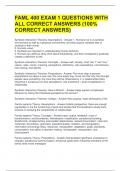FAML 400 EXAM 1 QUESTIONS WITH
ALL CORRECT ANSWERS (100%
CORRECT ANSWERS)
Symbolic Interaction Theories: Assumptions - Answer-1. Humans live in a symbolic
environment as well as a physical environment, and they acquire complex sets of
symbols in their minds.
2. Humans value.
3. Symbols are important in understanding human behavior.
4. Humans are reflexive (they think about themselves), and their introspection gradually
creates a definition of self.
Symbolic Interaction Theories: Concepts - Answer-self, society, mind, the "I" and "me,"
values, roles, norms, meaning, perceptions, definitions, role expectations, role behavior,
role making, and identity
Symbolic Interaction Theories: Propositions - Answer-The more clear a persons
expectations are about a new role, the more easily they move into that role; the stronger
people value something, the more they will be influenced by it; in relationships there
should be a consensus on their perceptions; role enactment = level of satisfaction in
relationship
Symbolic Interaction Theories: How is Works? - Answer-helps explain complicated
behavior by taking the individuals perceptions into account
Symbolic Interaction Theories: Critique - Answer-Very popular, basic philosophy of life
Family-systems Theory: Assumptions - Answer-holistic perspective, there are enough
regularities in the the functioning of parts and wholes that it's beneficial to study them,
focuses on studying the complexities of relationships
Family-systems Theory: Concepts - Answer-input, output, feedback, rules of
transformation, and boundaries, individuation, mystification, paradoxical bonding,
double bind, complementary and parallel relationships, metacommunication, rules and
metarules, boundaries, openness, pseudomutuality, coalition, and triangulation,
information and energy flows, resources, mesosystem, adaptation, goals, standards,
consumption, and styles of decision-making, microsystem, mesosystem, and
macrosystem
Family-systems Theory: Propositions - Answer-Homeostasis hypothesis (resistance to
change), paradoxical communication: emotional upset when influential members of the
family send mixed messages
, Family-systems Theory: How is works? - Answer-For practitioners seeking to make a
difference in family life, the ecological branch is useful in government and industrial
settings
Family-systems Theory: Critique - Answer-Downside: gender issues and abusive
processes in family systems were ignored in this perspective; little attention was paid to
the "ego" aspect of the family system; large focus on the internal processes of family;
focuses on complex patterns of life
Feminist Theory: Assumptions - Answer-women are oppressed, familial issues are also
political issues, Feminists need to have double vision: success in the social system and
attention to change in social institutions; it is ethical to work towards emancipation
Feminist Theory: Concepts - Answer-gender, oppression, discrimination, emancipation,
political, connectedness, personal experience, enlightenment, and power
Feminist Theory: Propositions - Answer-Gender inequality is present at many levels in
society; emancipation is imperative; works to promote gender equality
Feminist Theory: How is works: - Answer-Seeks to eliminate gender bias on every level,
takes an activist orientation
Feminist Theory: Critique - Answer-Useful theory to promote social action; seen as an
inspiring alternative to positivism; these ideas are revolutionizing academia (slowly but
surely)
What are the stages of the Family Development Theory? - Answer-1. Married Couple
2. Childbearing
3. Preschool age
4. School age
5. Teenage
6. Launching Center
7. Middle-age parents
8. Aging Family Members
Family Development Theory: Tasks for Married Couple stage: - Answer-- Establish
mutually satisfying marriage
- Adjusting to pregnancy
- fitting into kin network
Family Development Theory: Tasks for Childbearing Stage: - Answer-- Having,
adjusting to, and encouraging development of infants
- est. satisfying home for parents and infants




